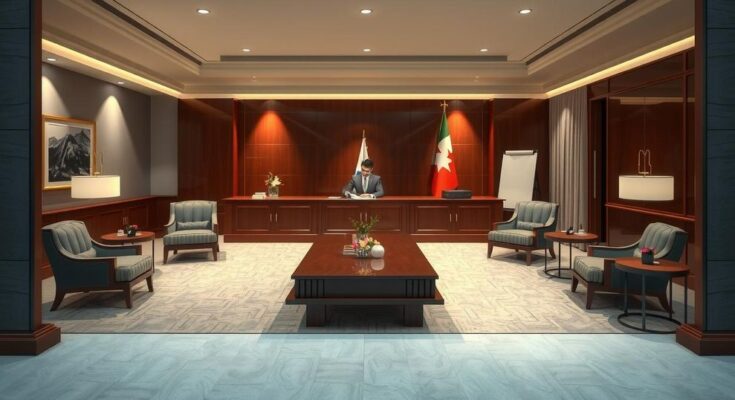Iran reports progress in indirect nuclear talks with the U.S., with a new round scheduled for April 26. Foreign Minister Abbas Araghchi noted constructive discussions, while cautioning against excessive optimism. The focus remains on whether Iran can maintain a civilian nuclear program, amidst accusations of potential weapon development.
Iran recently announced that its discussions with the United States concerning its nuclear program have made progress, leading to a planned third round of negotiations next week. According to Iran’s foreign ministry, Iranian Foreign Minister Abbas Araghchi has described the previous round of talks as constructive, marking a potential step forward in resolving the ongoing nuclear issue. These discussions between the two nations were held for about four hours at Oman’s embassy in Rome, where U.S. envoy Steve Witkoff also participated.
The negotiations are set to continue on April 26 with senior officials expected to rejoin after technical talks, which are to take place in the days preceding that date. Araghchi expressed cautious optimism regarding progress, saying, “There’s no reason for excessive optimism or pessimism,” as both sides aim to build a better understanding of each other’s goals.
Observers noted that the tone from the Iranian delegation was more positive than previous interactions. Al Jazeera’s James Bays reported that the atmosphere surrounding the talks has shifted significantly, and suggested a faster pace for forthcoming negotiations. This shift follows their first high-level talks in Muscat after the U.S. pulled out of the 2015 nuclear deal in 2018.
While the discussions have focused predominantly on establishing a framework for negotiating, the critical questions remain surrounding whether Iran will be allowed to retain its civilian nuclear program. Western nations have long accused Iran of pursuing nuclear weapons, a claim Iran consistently refutes. Rafael Grossi, head of the International Atomic Energy Agency, recently indicated that Iran is “not far” from gaining nuclear weapon capabilities, underscoring the urgency of reaching a deal.
Despite no formal diplomatic relations since 1979, Iran and the U.S. have engaged in these rounds of talks amidst ongoing sanctions and escalating tensions. U.S. President Donald Trump has indicated a willingness to negotiate but reiterated the consequences should diplomacy falter. However, as Araghchi remarked on the U.S. position, he pointed out that while the U.S. showed commitment in their last meeting, Iran remains cautious regarding their intentions.
The latest developments in the Iran-U.S. nuclear discussions indicate a potential shift towards more productive negotiations. With the next round of talks scheduled, there is tentative optimism surrounding the process. However, several significant challenges remain, particularly regarding the nature of Iran’s nuclear program. As both sides grapple with these complex issues, the outcome of the upcoming meetings could prove crucial for future relations and regional stability.
Original Source: www.aljazeera.com




